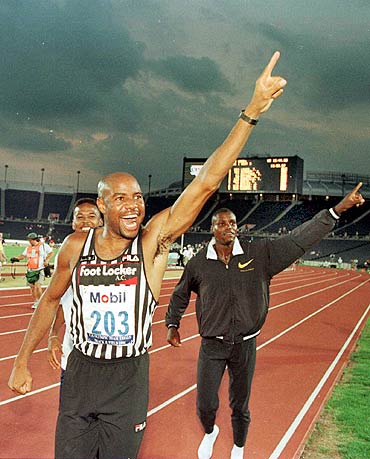
A chance meeting with long jump world record holder Mike Powell earlier this week, coupled with the ongoing Diamond League, inspires Senior Associate Editor Bikash Mohapatra to take a look at athletics records that have withstood the test of time.
Since Mike Powell is the reason why I am writing this, I will start with him.
The American cleared 8.95 metres at the IAAF World Championships in Tokyo (Japan) back in 1991, his effort ensuring his compatriot Bob Beamon's 23-year-old old mark - a jump of 8.90 metres at the Mexico Olympics in 1968 - was finally broken.
There have been many long jumpers thereafter who have won gold medals at major international events since, but none have come anywhere close to Powell's mark.
The man himself couldn't replicate the feat. While he successfully defended his world title in Stuttgart (Germany) two years later, the distance (8.59 metres) was nowhere close to his world mark.
On August 30 this year, it will be 20 years that Powell, now 47, has held this record.
* The list includes only those athletes who have held on to their records for more than a decade
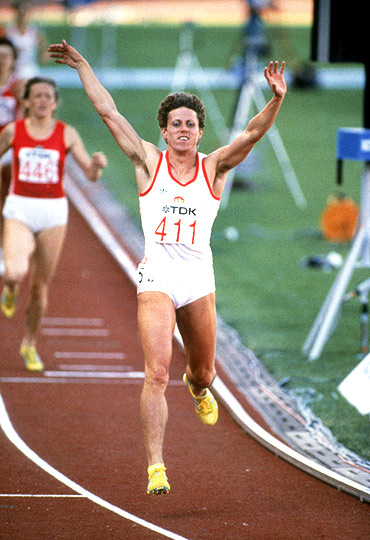
A late bloomer, Jarmila Kratochvilova's first brush with fame came in the Moscow Olympics in 1980 when she won silver in the women's 400 metres.
Three years later, the Czech, then 32, surprisingly broke the 800 metres world record in Munich, with a timing of 1:53:28 seconds.
Her effort helped her eclipse the mark of 1:53:43s set by Nadezhda Olizarenko of the erstwhile Soviet Union at the Moscow Olympics.
At the inaugural World Championships in Helsinki (Finland), she won gold medals in both the 400 metres and the 800 metres, thereby completing a double.
Her timing (47.99 secs) in the 400m was a world record, eventually broken by her nemesis Marita Koch in 1985.
Kratochvilova's 800 metres mark though still stands. In fact on the 26th of this month, it will be 28 years since she achieved the feat.
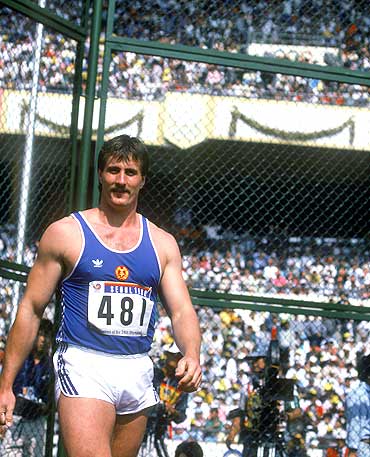
June 6, 2011 marked the 25th anniversary of Jurgen Schult's world record.
On that day, back in 1986, the German discus thrower achieved the remarkable feat in Neubrandenburg.
His throw of 74.08 metres helped him break the previous mark (2.22m) set by Yuriy Dumchev of the erstwhile Soviet Union.
Schult went on to win the discus throw event at the 1987 World Championships in Rome and the Seoul Olympics in the following year.
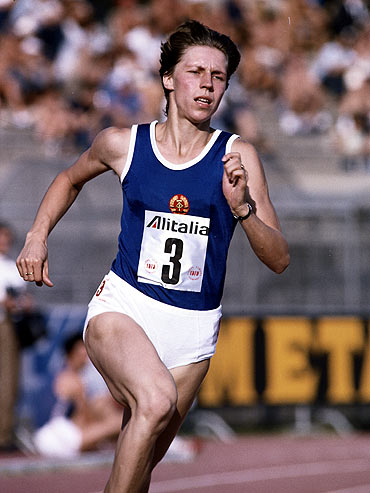
Marita Koch is one of the most decorated athletes of all-time.
Having secured her first major success at the Moscow Olympics in 1980, where she won gold in the women's 400 metres, the German went on to win three gold medals in the inaugural World Championships in Helsinki.
An East German boycott of the Los Angeles Olympics in 1984 denied her a chance to defend her title.
However, on in October 1985, she broke the 400m world record en route to winning the World Cup in Canberra (Australia).
Koch's timing of 47.60 secs bettered Czech Jarmila Kratochvilova's 47.99 secs set at the Helsinki worlds in 1983.
Twenty-six years later, Koch's record still stands.
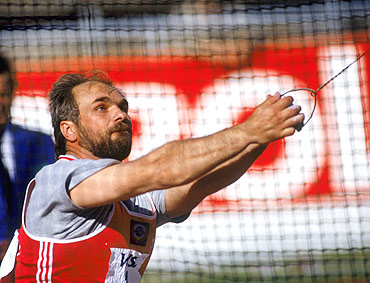
One of the most decorated hammer throwers of all-time, Yuri Sedykh's resume includes gold medals at successive Olympics, in Montreal (1976) and Moscow (1980). and the World Championships in Tokyo (1991).
Sandwiched in between his efforts in the Olympics and the worlds, is his effort at the European Championships in Stuttgart (Germany) in 1986.
His throw of 86.74 metres helped him set a new world record, bettering his own mark (86.66 m) set in Tallinn (Estonia) two months earlier.
In the history of hammer throw, only two other throwers have cleared over 86 meters -- Belarussian Ivan Tikhon (86.73m in Brest) and Sergei Litvinov (86.04m).
Next month will be the 25th anniversary of Sedykh's world record.
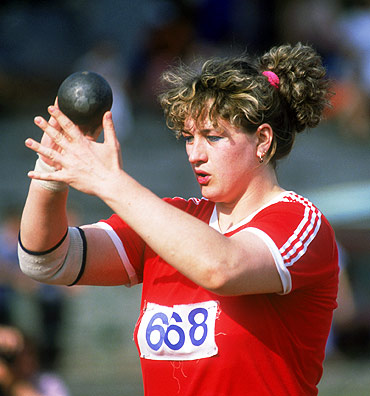
After the husband comes the wife!
Less than a year after future husband Yuri Sedykh broke the hammer throw record, a mark that still stands, Natalya Lisovskaya did the same in the women's shot put.
The Russian, then competing for the erstwhile Soviet Union, achieved a distance of 22.63 metres in June 1987 to break her own mark (22.53m) set in Sochi in 1984.
Lisovskaya went on to win the gold medal at the World Championships (in Rome) that year and at the Seoul Olympics the following year.
Twenty-four years later, her record (like her husband's) remains unbroken.
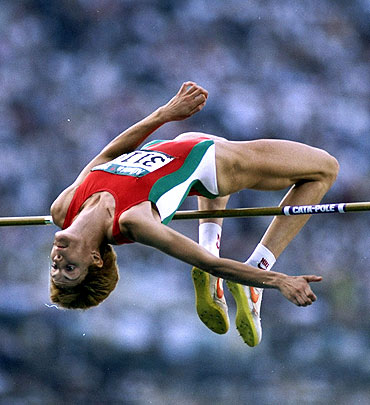
It's been 25 years now that Stefka Kostadinova has held the women's high jump world record.
On 25 May, 1986, the Bulgarian cleared 2.07 metres to equal her compatriot Lyudmila Andonova's mark set in East Berlin in 1984.
Six days later, Kostadinova bettered that record, jumping 2.08 metres at a meet in Sofia.
And in the 1987 World Championships in Rome, the Bulgarian cleared 2.09 metres en route to winning the gold. That marks stands as the world record in the discipline.
Kostadinova went on to win the world title for a second time in Gothenburg (Sweden) in 1995 before claiming her first and only Olympic gold medal in Atlanta a year later.
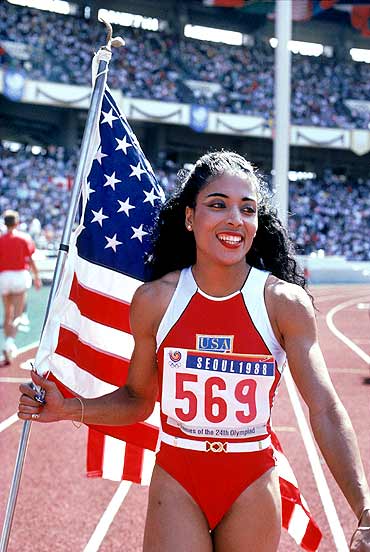
At the US Olympic trials in 1988, Florence Griffith-Joyner ran the 100 metres in 10.49 secs, bettering compatriot Evelyn Ashford's mark (10.76 secs), set in Zurich (Switzerland) four years earlier.
Two months later, at the Seoul Olympics she completed her 200 metres run in 21.34 secs, bettering her own mark (21.56) set earlier in the day.
Twenty-three years on, both the records remain intact.
And even 13 years after her death (of epilepsy), Florence Griffith-Joyner remains the fastest woman ever.
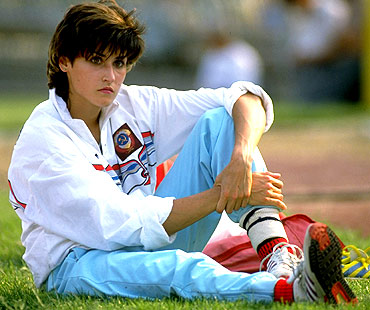
If the men's long jump world record (Mike Powell's) has remained unbroken in almost 20 years, the women's equivalent has been intact even longer.
When Galina Chistyakova of the erstwhile Soviet Union cleared a distance of 7.52 metres in an athletic meet in Leningrad (now St Petersburg) in 1988, she broke American Jackie Joyner-Kersee's mark (7.45 metres), set in Dresden (Germany) a year earlier.
Chistyakova could only manage a bronze medal in the Seoul Olympics a few months later, when Joyner-Kersee won comfortably.
In fact, she could never win either an Olympic or world title.
Her world record though remains untouched.
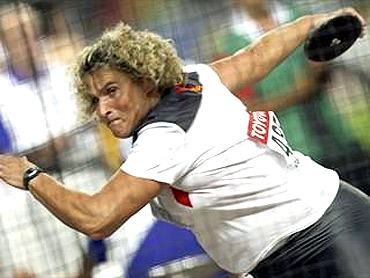
It was at Neubrandenburg again.
Two years after her compatriot Jugen Schult had set the men's discus throw at this medieval German city, Gabriele Reinsch set a new world record in the women's event with a throw of 76.80 meters.
Reinsch's throw was 2.24 meters further than the earlier mark (74.56 metres), set by Czech Zdenka ilhava in 1984.
Reinsch had an otherwise insignificant career.
Her discus world record though still stands.
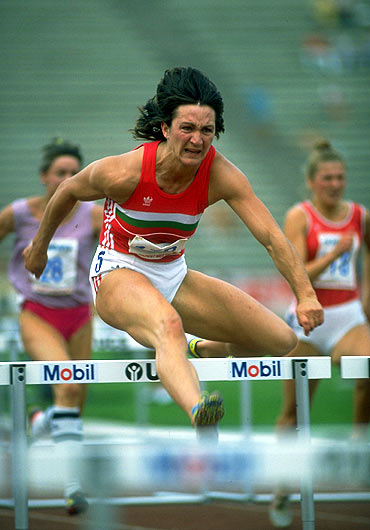
Yordanka Donkova set four world records in the 100 metres hurdles in 1986.
However, the following year compatriot Ginka Zagorcheva, who went on to win the event in the World Championships in Rome, usurped the mark by completing in 12.25 secs.
At Stara Zagora in 1988 though, Donkova had her revenge, completing the distance in a new record of 12.21 secs. It was her fifth world mark overall.
The Bulgarian went on to win the gold medal at the Seoul Olympics later that year. And that remained the highlight of her career.
Besides, her record still stands.
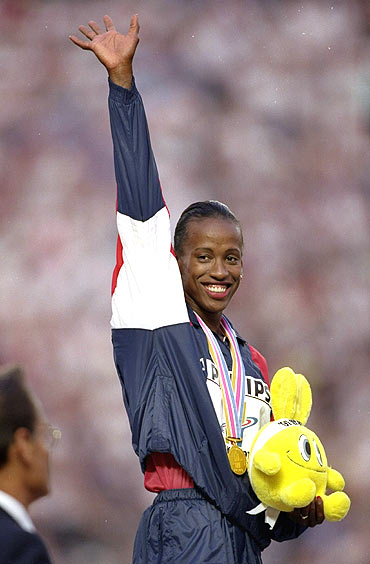
Arguably the greatest heptathlete ever, Jackie Joyner-Kersee won the Olympic gold medal in the event twice in succession, in Seoul (1988) and Barcelona (1992).
Her total of 7,291 points en route to the gold in Seoul remains a world record in the event.
Joyner-Kersee also won the heptathlon world title in 1987 (Rome) and 1993 (Stuttgart).
Besides, she was an equally good long jumper, winning the Olympic gold in 1988 and the world title in 1987 and 1991 (Tokyo).
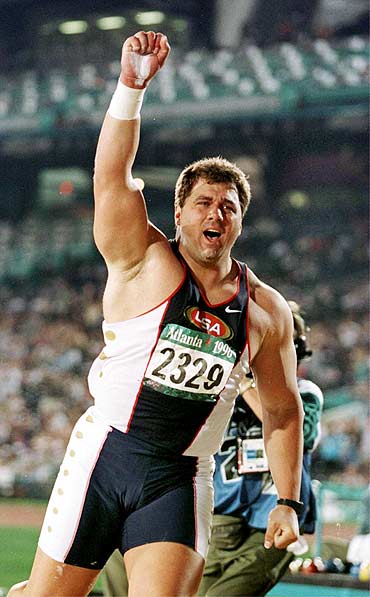
Randy Barnes was no match to Ulf Timmermann in the men's shot put final in the Seoul Olympics in 1988.
While the German, who had set the world record (23.06 metres) earlier in the year in Chania (Greece), won comfortably with a throw of 22.47 metres, the American had to settle for the silver (with 22.39 metres).
Two years later though, Barnes broke Timmermann's record with a throw of 23.12 metres in Los Angeles.
Three months later, he tested positive and was banned for more than two years, thereby failing to participate in the Barcelona Olympics.
Barnes returned to win gold in style in the Atlanta Olympics (1996) with a throw of 21.62 metres. He tested positive again in 1998 and was banned for life.
His world record remains intact though.
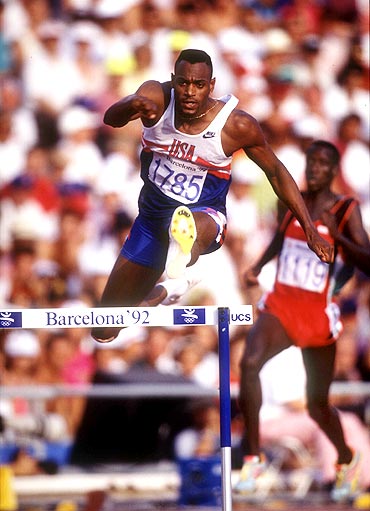
It was a double whammy, so to speak.
When Kevin Young ran the 400 metres hurdles in 46.78 seconds at the Barcelona Olympics in 1992, it ensured him both the gold medal and the world record.
Young's compatriot Edwin Moses had held the record for 16 years between 1976 and 1992, bettering it three times in the process
Young, who went on to win the world title in the discipline in Stuttgart a year later, has now held the record for 19 uninterrupted years.
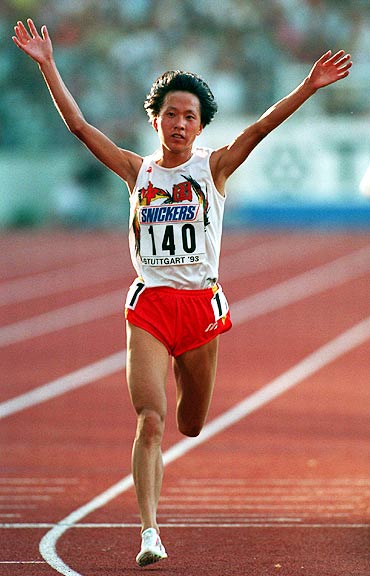
Wang Junxia surprised one and all in August 1993 when she won the women's 10,000 metres at the World Championships in Stuttgart.
In fact, in that particular edition, Wang and other Chinese long distance runners under the tutelage of infamous coach Ma Junren, swept everything in front of them.
A month later, at the Chinese National Games, she broke the world record in both the 3,000 metres (the event has become defunct since) as well as the 10,000 metres.
Her timing of 29:31.78s in the latter helped her eclipse the earlier mark (30:13.74s) held by former world champion Ingrid Kristiansen of Norway.
Wang went on to win the 5,000 metres gold and a silver in the 10,000 metres at the Atlanta Olympics in 1996.
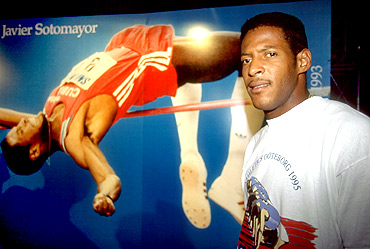
When Javier Sotomayor cleared 2.43 metres in Salamanca (Spain) in September 1988, he broke the existing high jump record by Swede Patrick Sjoberg by a metre.
The Cuban bettered the feat in July 1989 by clearing a height of 2.44 metres in San Juan.
And four years later, again in Salamanca, Sotomayor, by then an Olympic champion, cleared 2.45 metres.
The above mark remains untouched after 18 years.
Sotomayor went on to win the high jump world title twice in Stuttgart (Germany) and Athens (1997).
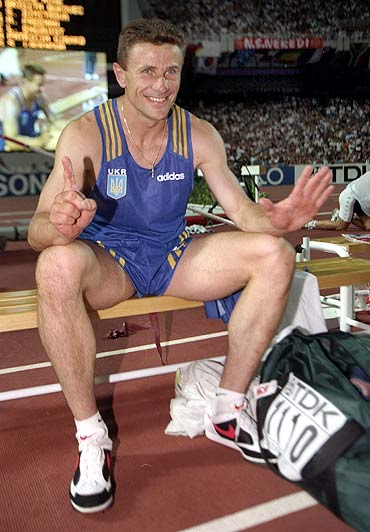
Sergey Bubka's feats can't be described in words.
The legendary Ukrainian pole vaulter broke the world record on 17 occasions.
And, save for one, when he reclaimed it from Frenchman Thierry Vigneron, the rest were just about bettering his own effort.
Between August 1984 and July 1994, Bubka broke his own mark on 14 occasions.
His final clearance, 6.14 metres (more than 20 feet) achieved in Sestriere (Italy), remains the world mark for the discipline.
Besides breaking world records, Bubka also claimed a record six world titles and also won the gold medal at the Seoul Olympics in 1988.
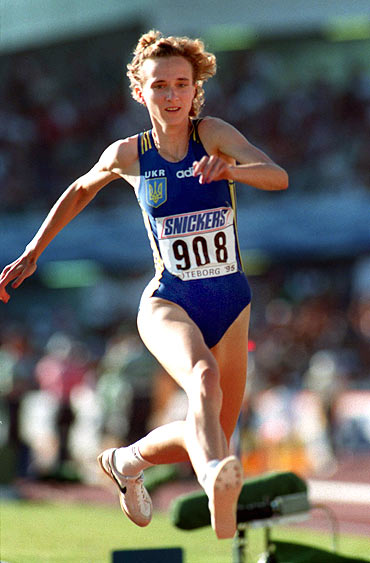
When Inessa Kravets cleared a distance of 15.50 metres at the World Championships in Gothenburg (Sweden) in 1995, she had broken the existing triple jump world record by quite a distance.
Russian Anna Biryukova, the previous record holder, had managed to jump 15.09 metres in Stuttgart two years earlier.
It was a perfect comeback for the Ukrainian, banned for three months in 1993 for use of stimulants.
Besides winning the triple jump title in Gothenburg, Kravets also repeated the feat at the Atlanta Olympics a year later.
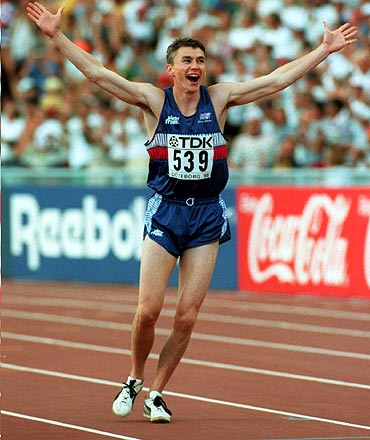
Jonathan Edwards's feat was a historic one.
At the World Championships in Gothenburg (Sweden) in 1995, the Briton broke the world triple jump record twice during the event.
His first jump made him the first to break the 18-metre barrier (18.16 metres). And less than half an hour later, Edwards jumped 18.29 metres (60 feet) to claim the world title.
The record remains untouched even after 16 years.
Edwards went on to win the triple jump gold medal at the Sydney Olympics in 2000 before claiming a second world title in Edmonton (Canada) a year later.
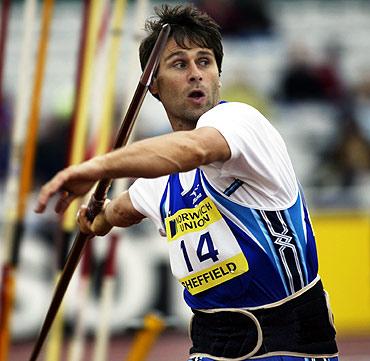
Jan Zelezny first claimed the world javelin record in May 1987, his throw of 87.66 metres in Nitra (Czech Republic) helping him erase German Klaus Tafelmeier's existing record (85.74).
The Czech lost it to Swede Patrik Boden (89.10) in 1990 and three months later, it was Briton Steve Backley who held the record (89.58m).
Zelezny retained and lost his record in the same month (July 1990) but those marks were erased after the IAAF banned the serrated tails in 1991.
Backley, having got back his record, upped it further in 1992 with a throw of 91.46 in New Zealand.
However, in 1993 Zelezny regained his record with a throw of 95.54 metres in Pietersburg (South Africa).
The Czech broke his own record on two occasions, the last of which, a distance of 98.48 metres achieved in Jena (Germany) in May 1996 remains the best javelin effort yet.
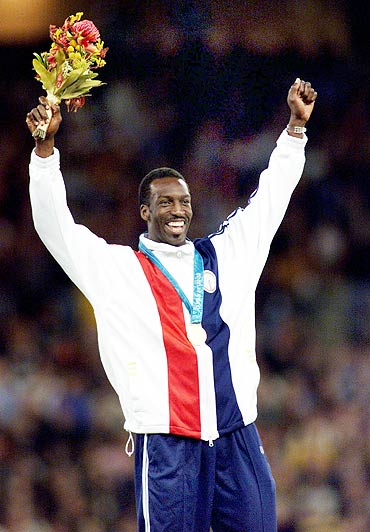
It took him 11 years but legendary American athlete Michael Johnson did break his compatriot Butch Reynolds' world record in the 400 metres.
Johnson's timing of 43.18 secs, achieved in the World Championships in Seville (Spain) in 1999, bettered Reynolds's effort (43.29 secs) in Zurich (Switzerland) in 1988.
Johnson, who won four Olympic gold medals and eight World championships golds, also held the 200 metres (between 1996 and 2008) before Jamaican Usain Bolt bested it at the Beijing Olympics.
Bolt went on to improve his effort in Berlin a month later.
Johnson's 400 metres mark is still a world record.
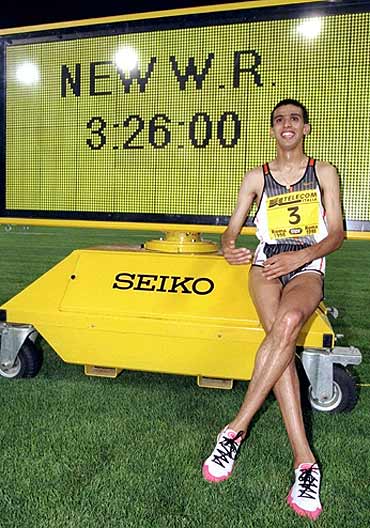
Hicham El Guerrouj is also referred to as the 'King of the Mile.'
The Moroccan is one of the best middle distance runners ever, having two Olympic and four World championships gold medals to show for his efforts.
In 1997, El Guerrouj became the first athlete to beat the legendary Noureddine Morceli over 1500 metres in four years.
A year later, in Rome, the Moroccan eclipsed the Algerian's world record. While Morceli had a timing of 3:27.37 set in Nice (France) in 1995, El Guerrouj clocked 3:26.00 in Rome (Italy).
The record has not been touched in 14 years.
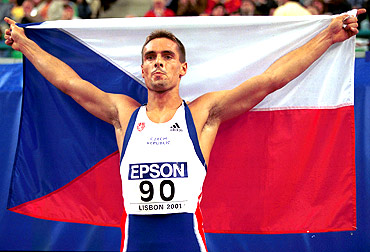
A decathlete par excellence, Roman Sebrle achieved a first when he broke the world record in the discipline in Gotzis (Austria) in May 2001.
The Czech became the first decathlete to top 9,000 points.
Sebrle's tally of 9,026 points eclipsed the earlier record (8994 points) held by compatriot Tomas Dvorak since 1999.
Thereafter, Sebrle went on to win the decathlon gold medal at the Athens Olympics in 2004 before repeating the feat at the 2007 World Championships in Osaka (Japan).